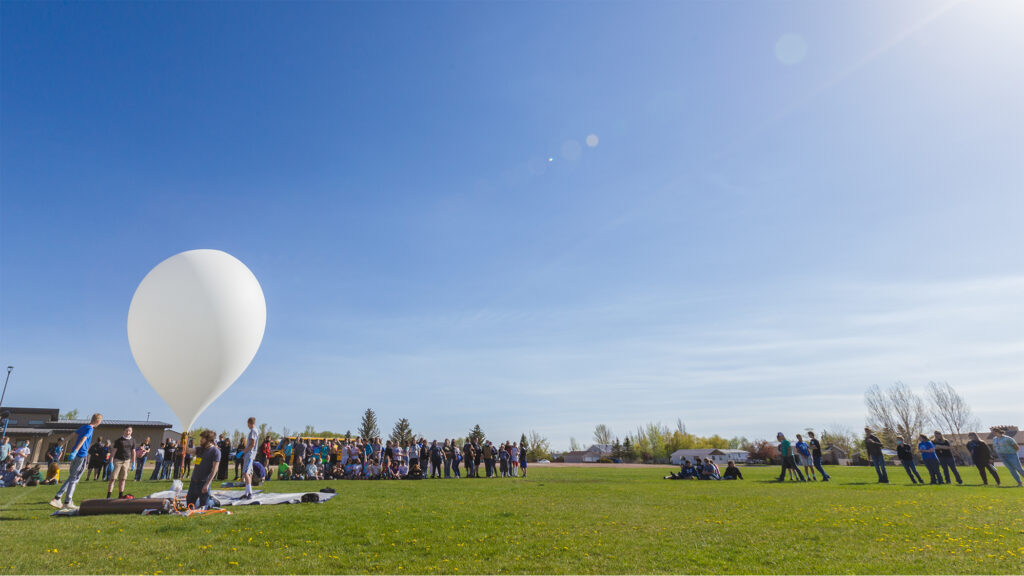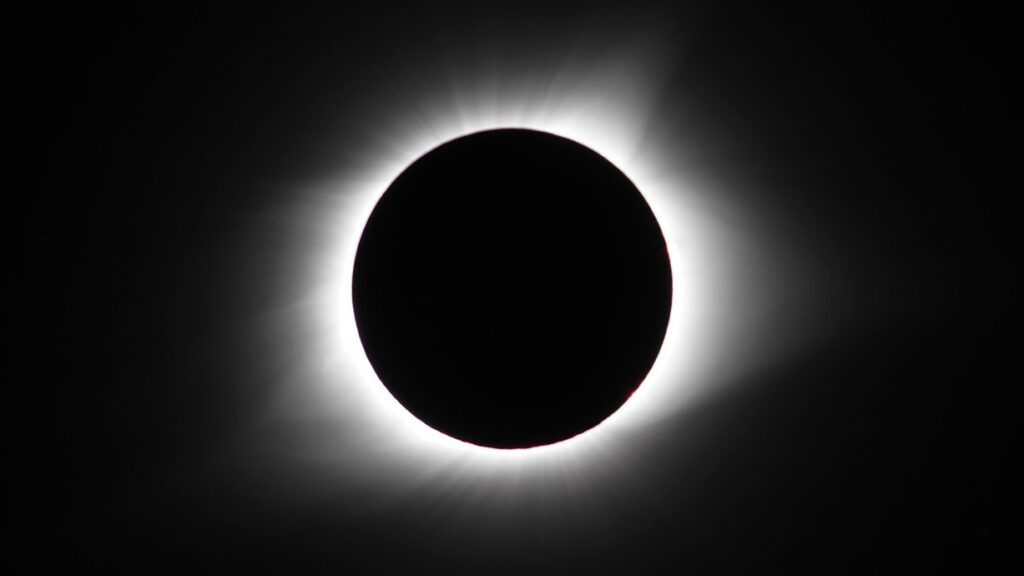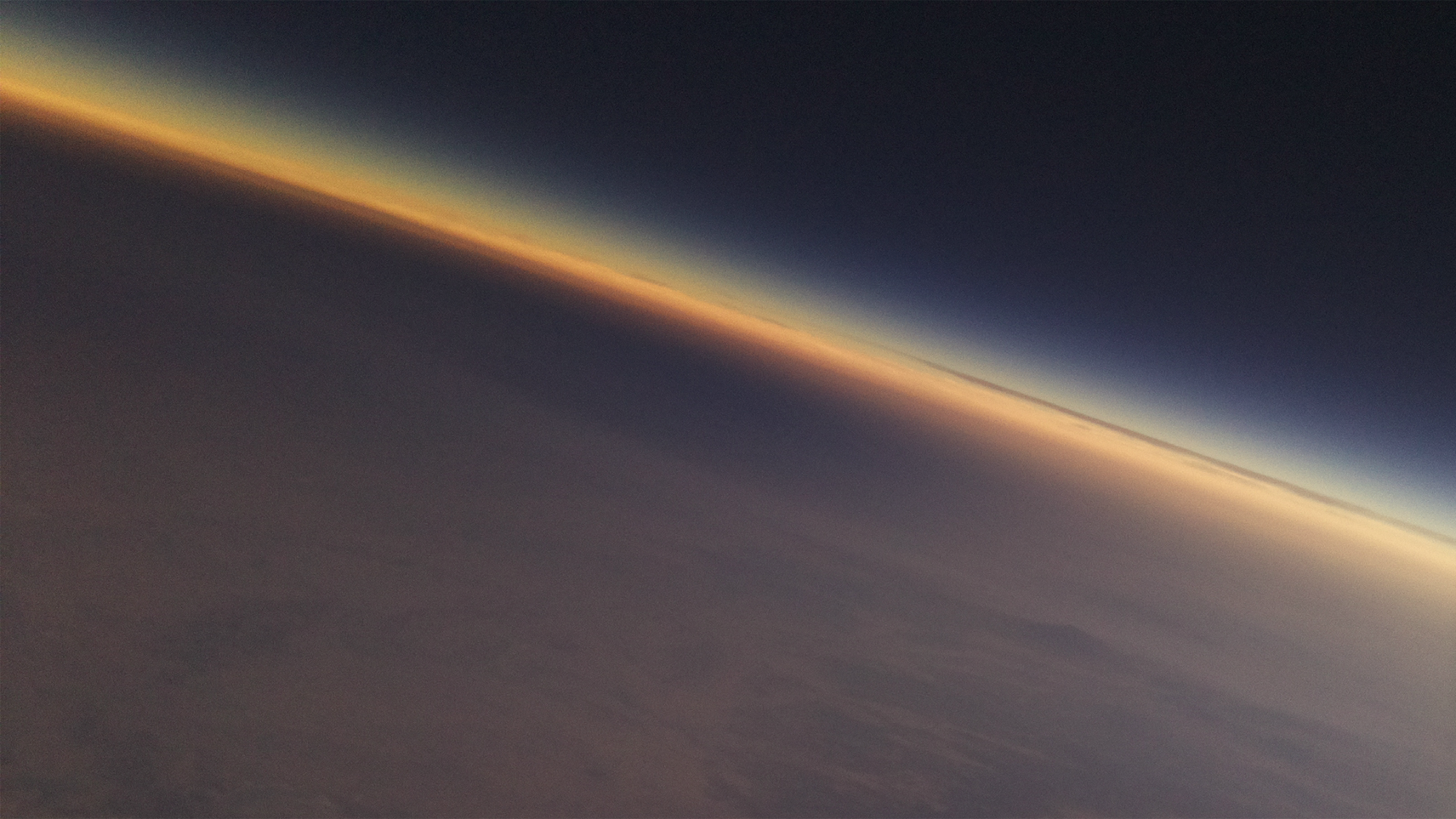2023–24 UNDERGRADUATE ECLIPSE PROJECT
Exploring Solar Eclipses with Weather Balloons



APPLICATION DEADLINE: DECEMBER 9, 2022
(We still have spots available, so the application will stay open past the deadline)
Overview
The Wyoming Space Grant is planning to field a team of enthusiastic undergraduate students from the University of Wyoming (UW) and Laramie County Community College (LCCC) Albany County Campus to participate in the upcoming Nationwide Eclipse Ballooning Project (NEBP). This team will be one of many flying weather balloons from within the paths of the October 2023 annular solar eclipse and April 2024 total solar eclipse in a collective attempt to detect atmospheric gravity waves and other phenomena. Participants will travel to both solar eclipses to obtain the meteorological observations, allowing them to witness one of nature’s most breathtaking celestial events. Throughout the project, participants will engage with introductory atmospheric science concepts, data collection and analysis, and various operational efforts. No previous experience in atmospheric science or high-altitude ballooning is required. Women and students from underrepresented groups are encouraged to apply.
Eligibility
- Open to undergraduate students from all majors and academic backgrounds
- Students must be enrolled full-time at UW or LCCC (Albany County Campus) through at least May 2024
- Ideal participants are responsible, committed students with a genuine interest in the project and ability to work as part of a team
- Participants must be U.S. citizens
Project Award Details
This project will run from January 2023 through May 2024. Participants will receive monetary compensation for their time participating in the hands-on phases of the project. Below are further details regarding funding and monetary support:
- Participants will receive a modest stipend ($12/hour) for the following:
- In-person, hands-on training activities during August 2023, Fall 2023, and Spring 2024
- All hands-on activities and flight operations during the October 2023 annular eclipse campaign
- All hands-on activities and flight operations during the April 2024 total eclipse campaign
- All other project-related costs and travel expenses (including meals) will be covered, with one exception (see Requirement #2 below)
- Depending on funding, additional stipends may also be available for a few students who wish to become more involved in the project (either full-time or part-time) during Summer 2023 or Summer 2024
Project Requirements
To be considered, students must be able to commit for the full duration of the project. Some participation will be required in Summer 2023. Participation in Summer 2024 will be optional. Please carefully read the following project requirements and expectations before applying:
- All participants are REQUIRED to fully participate in both the October 14, 2023 and April 8, 2024 solar eclipse campaigns. To account for travel, setup, and other logistics, each campaign will require a 5–7-day commitment from all participants, centered around the eclipse (October 11–17, 2023 and April 5–11, 2024). We will provide students with university-approved excused absences for any missed class time.
- All participants are REQUIRED to enroll in a 1-credit introductory training course at UW during the Spring 2023 semester. This will provide participants with the necessary background information, technical knowledge, and skills needed for the project. The course will entail approximately 1 hour/week of in-person instruction and 2 hours/week of out of class coursework. Tuition for this course will NOT be covered by the Wyoming Space Grant and must be paid for by the student.
- All participants are REQUIRED to participate in at least one Wyoming Space Grant K-12 high-altitude balloon outreach event during the project (likely during the Spring 2023 semester).
- All participants are REQUIRED to participate in 2–3 weeks of in-person, hands-on training in August 2023, prior to the beginning of the fall semester. This pre-semester training period will be crucial to the success of the project. (The training period may begin as early as Monday, August 7, 2023.)
- All participants are REQUIRED to participate in eclipse preparation activities—including meetings, test flights, and any additional hands-on training—in Fall 2023 and Spring 2024, leading up to each eclipse campaign. These activities may occasionally take place on weeknights or weekends, depending on participant availability.
- Participants who are eligible to drive in the United States MUST complete a UW motor vehicle request (MVR) to become approved to drive UW rental vehicles.
- All participants MUST sign a photo release waiver granting the Wyoming Space Grant permission to use photos/videos of the participant in official organization publications, such as digital media (e.g., website and social media), promotional material, in print, etc.
Application Submission
Completed applications must be submitted through this ONLINE APPLICATION FORM. You should receive an e-mail confirming receipt of your application within two business days. If you do not receive this confirmation please contact our office. If you encounter any issues with the application, let us know: wsgc@uwyo.edu.
There are four parts required for a complete application:
- Online Application Form
- Personal Statement of Interest – (1–2 pages) Why are you interested in participating in this project? What qualities and strengths will you bring to the team? Highlight any relevant experience you have with team projects, research, or computer programming.
- Student Resume – (2 pages max)
- Student Transcripts – (No page limit) Unofficial transcripts are acceptable.
Selection Criteria
We plan to select 6–10 participants for this project. Applicants must be able to meet all project commitments and expectations listed above. Enthusiastic, responsible applicants who exhibit a genuine interest in the project and an eagerness to work collaboratively as part of a team will receive strong consideration. Academic performance will also be considered but will not be the primary factor driving the selection process. We hope to have a diverse team composed of students with differing backgrounds and a wide range of majors and career interests.
Project Timeline
SPRING 2023
- 1-credit introductory training course
- All students meet once per week with instructor(s)
- Students learn about the NEBP, stratospheric ballooning, relevant STEM topics (eclipses, meteorology), etc.
- Some on-your-own coursework included each week
- Students participate in K-12 high-altitude balloon events
SUMMER 2023
- Some students may wish to participate in a full-time summer internship elsewhere, or (if funding is available) a ballooning-related internship with the Wyoming Space Grant
- Early/mid August: All student participants return to Laramie for hands-on training and test flights for several weeks before the start of fall semester
FALL 2023
- Continue hands-on training and test flights as needed
- Team meets regularly to prepare for annular eclipse
- October 11–17: Annular eclipse campaign
- Preliminary analysis of annular eclipse data
- Students may also give presentations, participate in media activities, and conduct outreach to promote the NEBP
SPRING/SUMMER 2024
- Conduct test flights as needed leading up to total eclipse
- Team meets regularly to prepare for total eclipse
- April 5–11: Total eclipse campaign
- Preliminary analysis of total eclipse data
- Summer (optional): Complete final data analysis, model simulations, presentations/publications, etc.
Benefits of Participating
By participating in the project, students will:
- Learn new technical skills and increase understanding of STEM career opportunities
- Strengthen STEM career skills such as problem solving, teamwork, and knowledge-sharing
- Participate in a nationwide NASA effort
- Be part of a diverse, multi-disciplinary team
- Use cutting-edge technology to conduct scientific research
- Have access to NASA subject-matter experts and national leaders in stratospheric ballooning
- Receive independent study course credit and monetary support
- Potentially contribute to and be a co-author on a peer-reviewed scientific journal article
FREQUENTLY ASKED QUESTIONS
- How much will it cost to participate?
Aside from tuition for the required 1-credit introductory course in Spring 2023 (which must be paid for by the student), student participants will not have to pay any other out-of-pocket expenses to participate in the project. All other project-related costs, including equipment, supplies, and travel expenses (rental vehicles, lodging, and meals) to locations outside of the Laramie area, will be covered either by the Wyoming Space Grant or the NEBP. - Can I still participate if I am unable to participate in both of the solar eclipse campaigns?
No, the NEBP requires that all student participants take part in both October 2023 and April 2024 solar eclipse campaigns (barring any unforeseen medical or family emergencies). If you cannot make that commitment, you should not apply. - Do I have to enroll in the 1-credit introductory course in Spring 2023?
Yes, this is non-negotiable. This course will be crucial for providing participants with the necessary background information, technical knowledge, and skills needed to continue with the project. We realize that tuition isn’t free, however if you are already enrolled full-time (which you must be to be eligible for the project) then we would argue that taking one extra credit to participate in this project is well worth the educational investment. - I don’t have a car, can I still participate?
Yes! A lot of our activities will take place on campus at UW. However, we will likely spend a considerable amount of time off campus as well. In those situations, transportation will be provided to any participants within Laramie who need it. - Why are there so many requirements?
This project will include field work during both eclipses and data analysis afterwards. To do all of this successfully, we need committed, reliable students that are able to participate in all phases of the project. Each phase—from the 1-credit introductory training course in Spring 2023 to the hands-on training in August/September 2023 to the annular eclipse in October 2023—will be critical for preparing participants for field operations during the April 2024 total solar eclipse. We include these requirements to make sure that applicants understand what is to be expected of them should they be chosen to participate in the project. - What will we be doing during the summer training period in August 2023? How much time will it require?
We don’t have all the answers to this quite yet. In fact, we may not know for sure until May 2023. However, we do know that a considerable amount of time will be spent training participants how to fly the weather balloons and operate various equipment and meteorological instrumentation. Participants will be assigned different roles and need to learn various tasks, so the more we can practice together the better. As far as the time commitment is concerned, we do not expect it to be full-time. Instead, we will likely meet as a group several times per week during that 2–3 week period. We will try to avoid weeknights and weekends. Think of it as a professional orientation, and keep your schedule open accordingly. In other words, no vacations during that time, no part-time day jobs (unless that job is very flexible and willing to work around our training schedule), etc. Once our training period begins, it will need to be your #1 priority for those few weeks before the start of the semester. - During the summer, will I be able to take on a separate full-time job or participate in another internship program?
Yes, as long as you are back in Laramie and fully available for hands-on training by early August. In fact, many 10-week summer internships end in early August. - Is this fellowship open to non-UW students?
Yes, but only to students enrolled at the LCCC Albany County Campus. Since this will be a team project with lots of in-person activities, we can only accommodate students that are living in Laramie and attending either UW or LCCC. However, one of our affiliate community colleges—Casper College—is also planning to participate in the NEBP. Current or future Casper College students who are interested in getting involved with the NEBP should reach out to us (see our contact info below) and we will get you connected with the right people. - What are the K-12 high-altitude balloon outreach events all about?
You can learn more about our high-altitude balloon program here.

